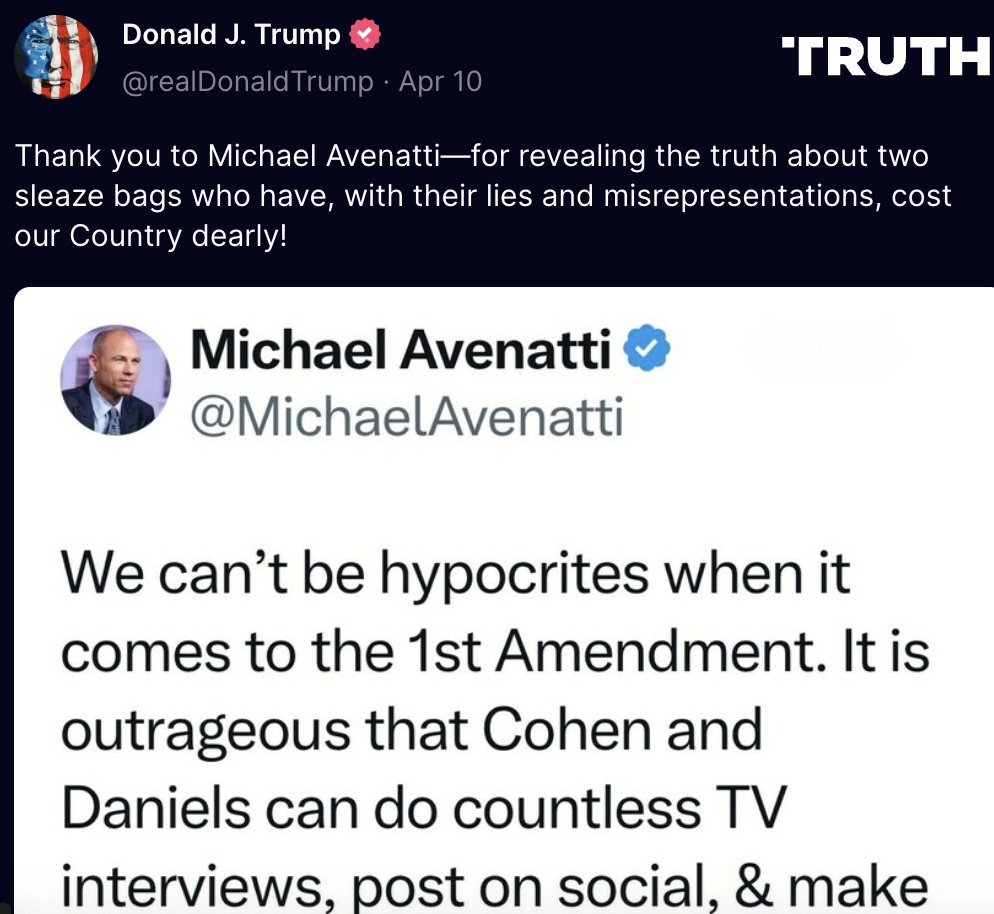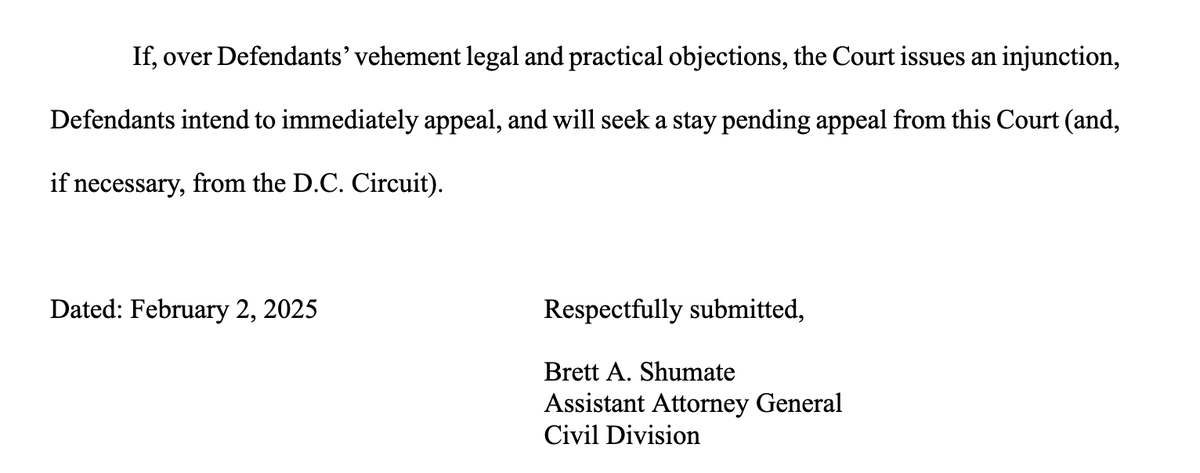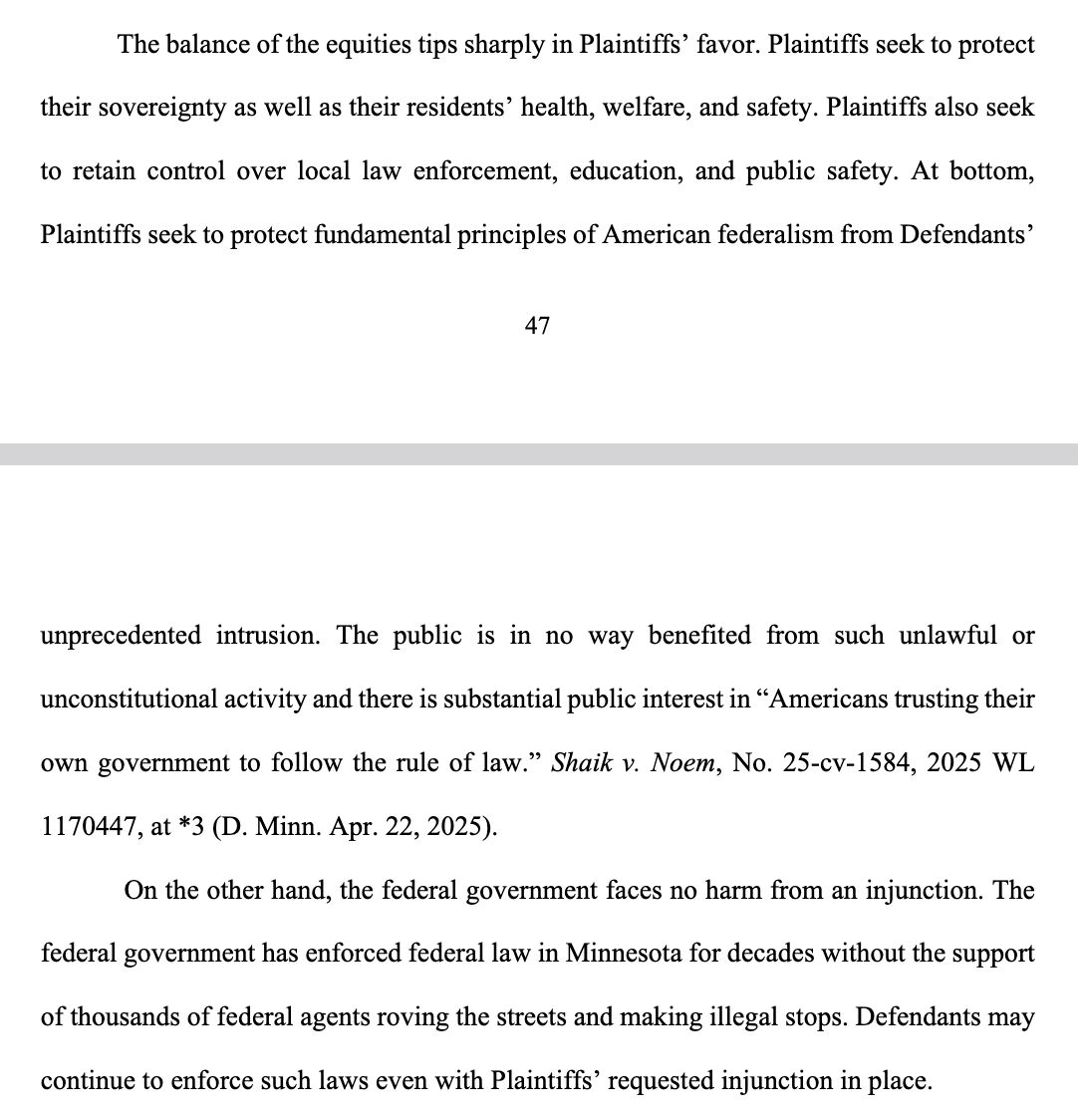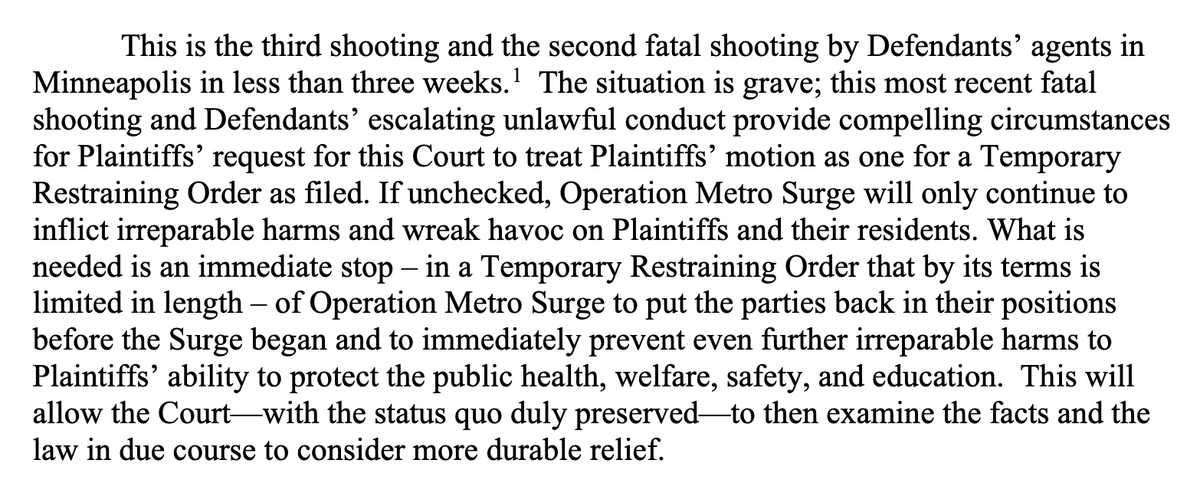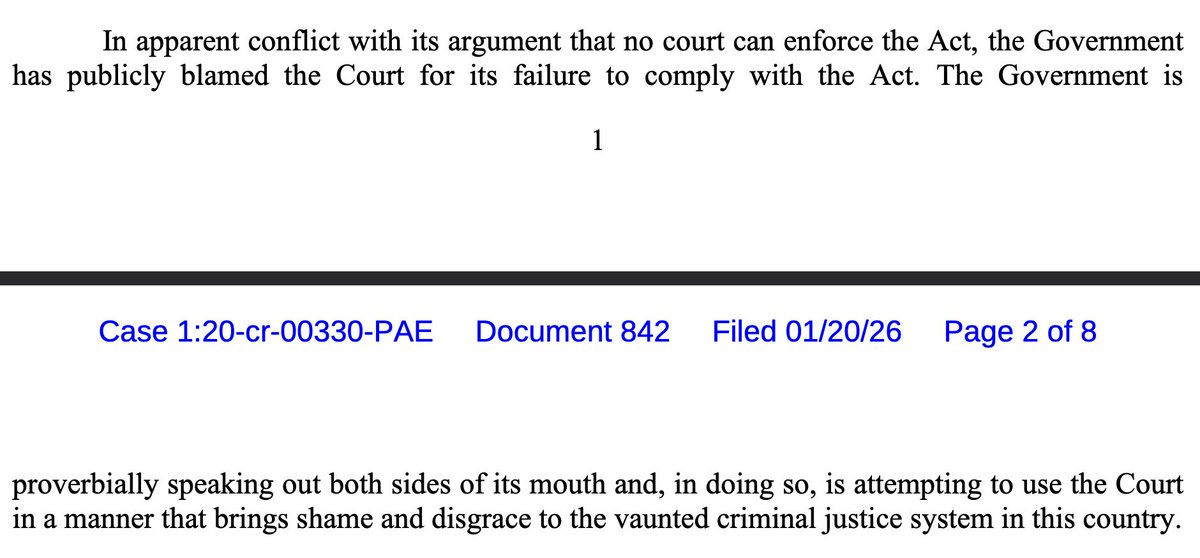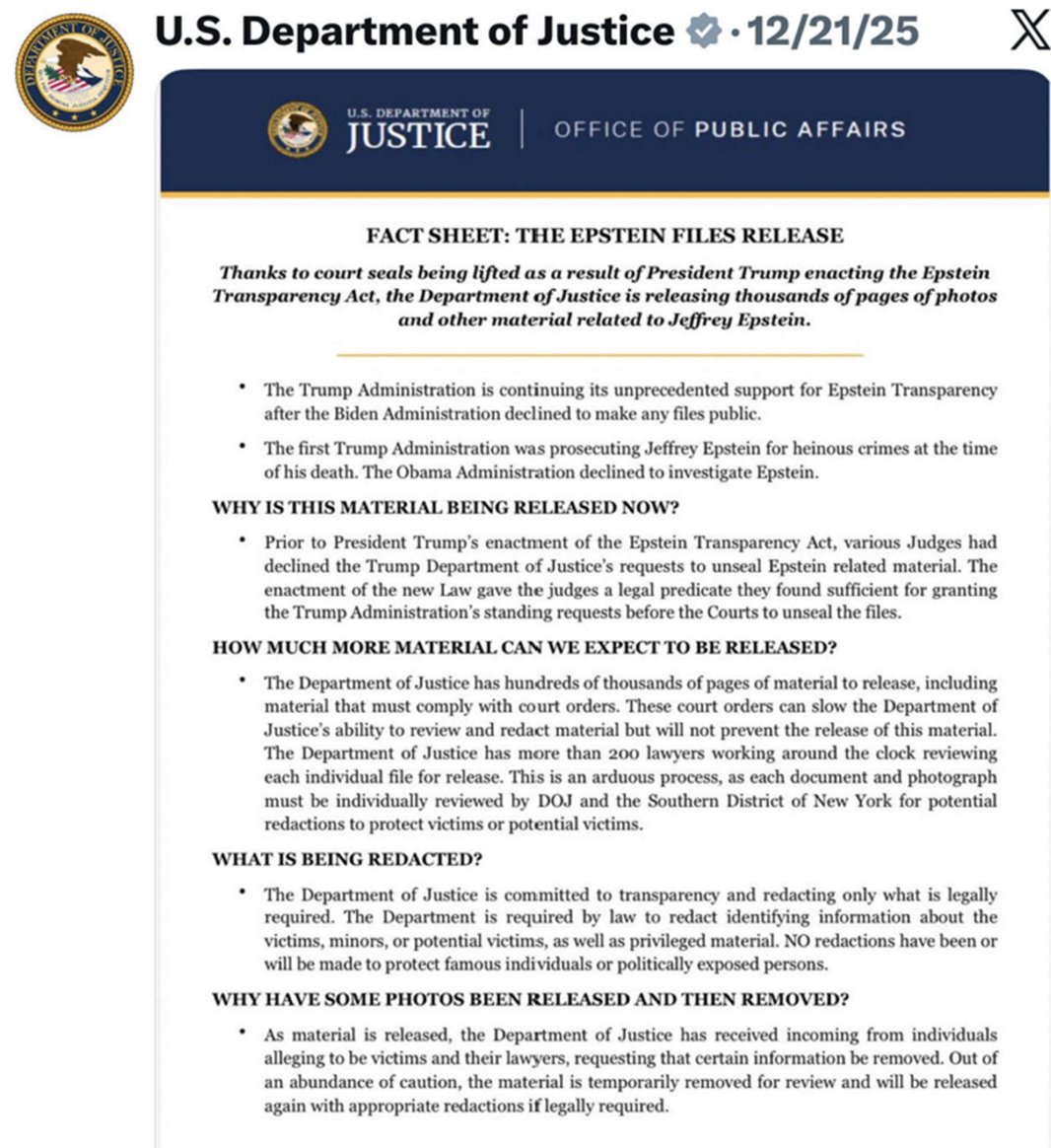Good morning from New York.
Before jurors hear a word of witness testimony this morning, the court has an unfinished order of business: Trump's contempt hearing over the gag order.
Follow every wrinkle of it and the trial here. 🧵
ICYMI, openings 🔗 justsecurity.org/94927/trump-tr…
Before jurors hear a word of witness testimony this morning, the court has an unfinished order of business: Trump's contempt hearing over the gag order.
Follow every wrinkle of it and the trial here. 🧵
ICYMI, openings 🔗 justsecurity.org/94927/trump-tr…
"What have we done?"
— Stormy Daniels' then-lawyer's text message to the National Enquirer's then-editor in chief on election night 2016, as Trump's inched toward victory
ICYMI: @Lawrence unpacked the blockbuster line on @TheLastWord.
— Stormy Daniels' then-lawyer's text message to the National Enquirer's then-editor in chief on election night 2016, as Trump's inched toward victory
ICYMI: @Lawrence unpacked the blockbuster line on @TheLastWord.
https://x.com/TheLastWord/status/1782726115146203598
What's the exact language of the gag order and the alleged violations?
@NormEisen, @KFAlegal, @AndrewWarrenFL, @JNKGoodman, and @SivenWatt lay them out—with copious screenshots—here.
They offer their analysis and predictions at @Just_Security.
justsecurity.org/94878/why-trum…
@NormEisen, @KFAlegal, @AndrewWarrenFL, @JNKGoodman, and @SivenWatt lay them out—with copious screenshots—here.
They offer their analysis and predictions at @Just_Security.
justsecurity.org/94878/why-trum…
This is the current language of the order.
Expect it to be parsed, in molecular fashion, during the morning session.
Expect it to be parsed, in molecular fashion, during the morning session.
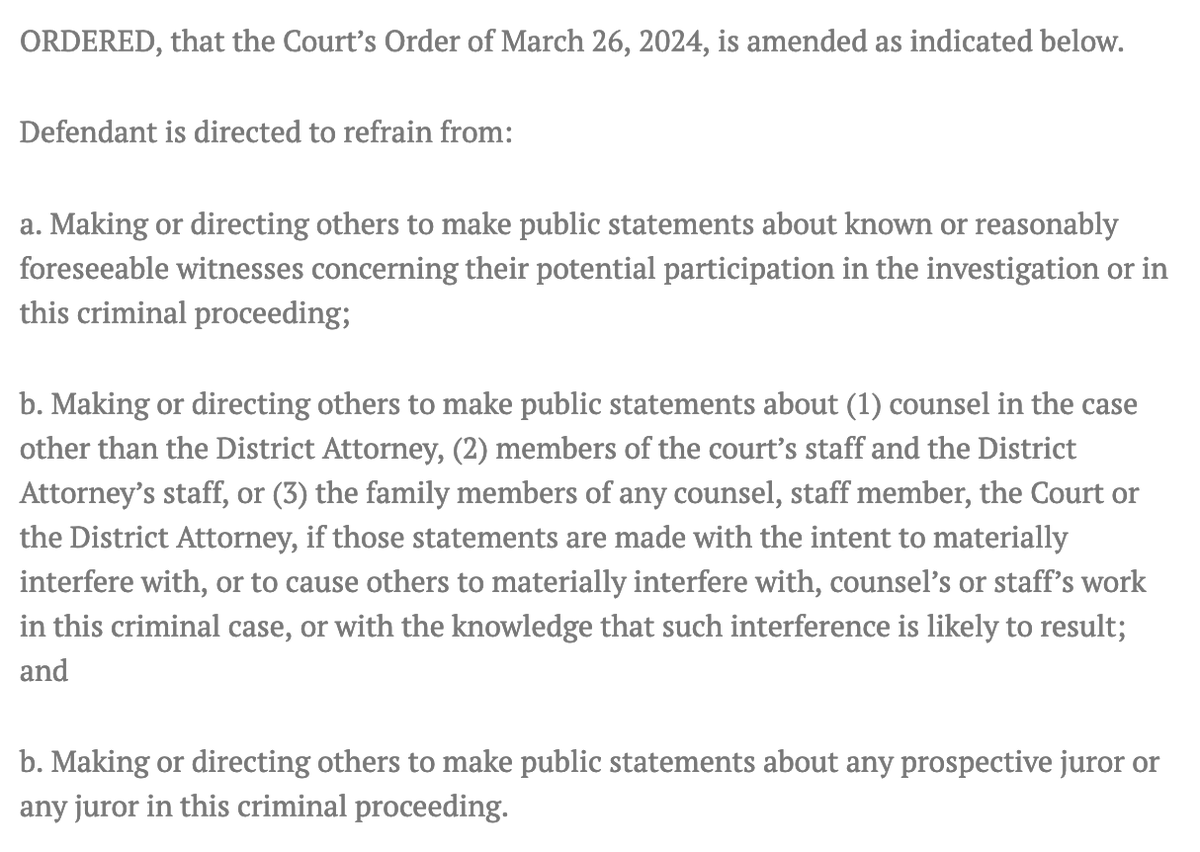
Trump has entered the courtroom and is now seated at the defense table.
He's back to the usual red tie.
He's back to the usual red tie.
Trump flinches a bit the moment the photojournalist pool sets up in front of him for their daily photos.
The session, as usual, is brief, and they're led out of the courtroom.
The session, as usual, is brief, and they're led out of the courtroom.
"All rise."
Justice Merchan enters and assumes the bench.
The attorneys register their appearances.
Merchan: "Good morning, Mr. Trump."
Justice Merchan enters and assumes the bench.
The attorneys register their appearances.
Merchan: "Good morning, Mr. Trump."
Per @BenFeuerherd in the hallway press pool:
"Trump ignored questions about why he did not appeal his DC gag order, if he'll continue to post about the witnesses, what he would do to quell protests at college campuses and if he thinks Michael Cohen is a 'sleaze bag.'"
"Trump ignored questions about why he did not appeal his DC gag order, if he'll continue to post about the witnesses, what he would do to quell protests at college campuses and if he thinks Michael Cohen is a 'sleaze bag.'"
Merchan:
"Two matters have been called into the record.
On April 15, prosecutors "asked this court to sign an order to show cause" on allegations that Trump violated the gag order on three occasions.
On April 18, they did so again on seven more alleged violations.
"Two matters have been called into the record.
On April 15, prosecutors "asked this court to sign an order to show cause" on allegations that Trump violated the gag order on three occasions.
On April 18, they did so again on seven more alleged violations.
ADA Christopher Conroy:
The court found the "types of extrajudicial statements" Trump made pose a "very real threat" to the integrity of the proceedings.
Yesterday, "here in this building, right outside those doors [...] the defendant violated the order again on camera."
The court found the "types of extrajudicial statements" Trump made pose a "very real threat" to the integrity of the proceedings.
Yesterday, "here in this building, right outside those doors [...] the defendant violated the order again on camera."
Conroy says prosecutors will be filing another application for an order to show cause "on this violation later today."
The prosecutor says Trump seems to think: "No one is off-limits to this defendant, and he can attack and intimidate any one he wants."
The prosecutor says Trump seems to think: "No one is off-limits to this defendant, and he can attack and intimidate any one he wants."
This is the third:
"Here again, judge, Michael Cohen is a 'reasonably foreseeable witness.' [...] This is again going after Michael Cohen's credibility, which is a recurring theme in these posts."
Two days before jury selection.
"Here again, judge, Michael Cohen is a 'reasonably foreseeable witness.' [...] This is again going after Michael Cohen's credibility, which is a recurring theme in these posts."
Two days before jury selection.

There are two more alleged violations sharing the same news articles, again — one with the "ICYMI," "in case you missed it," tag.
This one, the ninth on the show-cause motion, screenshots an article in full going after Michael Cohen. 

Conroy calls this post particularly "disturbing," noting that Trump added to the quote.
Watters didn't initially say, "to get on the Trump jury."
That was Trump's embellishment.
"That was last Wednesday evening that that was going on," Conroy says.
Watters didn't initially say, "to get on the Trump jury."
That was Trump's embellishment.
"That was last Wednesday evening that that was going on," Conroy says.

The next day, Conroy noted, a juror wound up getting cold feet because of the fear of disclosure of personal information.
"We ended up losing a juror," Conroy says, adding that was what the gag order was designed to prevent.
"We ended up losing a juror," Conroy says, adding that was what the gag order was designed to prevent.
Conroy:
"There is no doubt that the defendant made these statements."
He adds that Trump's addition to the Watters statement goes to the former president's "willfulness."
"There is no doubt that the defendant made these statements."
He adds that Trump's addition to the Watters statement goes to the former president's "willfulness."
Conroy:
"All of the posts here are made concerning the criminal proceeding." [...]
"It's just very clear that they were linked to this case."
"All of the posts here are made concerning the criminal proceeding." [...]
"It's just very clear that they were linked to this case."
Conroy, disputing the notion that Trump is simply engaging in political speech:
"Throwing a 'MAGA' into a post doesn't make it political. It may make it more ominous."
"Throwing a 'MAGA' into a post doesn't make it political. It may make it more ominous."
Conroy confronts Trump's defense that he's just responding to attacks by Michael Cohen and Stormy Daniels.
The Appellate Division informed him otherwise, the prosecutor notes.
"He knows he's forbidden. That's what the order says."
The Appellate Division informed him otherwise, the prosecutor notes.
"He knows he's forbidden. That's what the order says."
Conroy:
"There is no provision in this order for responding to attacks."
"There is no provision in this order for responding to attacks."
Conroy:
"By his logic, if someone not covered by the order says something mean," then he can attack them.
That view is "tortured at best" and would "eviscerate the clear meaning of this order" if the court would adopt that, the prosecutor adds.
"By his logic, if someone not covered by the order says something mean," then he can attack them.
That view is "tortured at best" and would "eviscerate the clear meaning of this order" if the court would adopt that, the prosecutor adds.
Conroy:
Trump is violating the "crystal-clear, unequivocal lines" of the court's gag order.
He pivots to the argument that reposts aren't his statements.
"That flies in the case of common sense."
Trump is violating the "crystal-clear, unequivocal lines" of the court's gag order.
He pivots to the argument that reposts aren't his statements.
"That flies in the case of common sense."
Conroy:
"We are not yet seeking an incarceratory penalty."
"Defendant seems to be angling for that."
"We are not yet seeking an incarceratory penalty."
"Defendant seems to be angling for that."
Up next: Trump's lead attorney Todd Blanche
"Just to set the record very straight and clear: President Trump does know what the gag order" allows him to do and not do.
Blanche claims that there's been no violation.
"Just to set the record very straight and clear: President Trump does know what the gag order" allows him to do and not do.
Blanche claims that there's been no violation.
Blanche:
There's no dispute that Trump's facing a "barrage" of attacks from all corners, particularly from Michael Cohen and Stormy Daniels.
Trump's comments "back to them" were not about their testimony.
There's no dispute that Trump's facing a "barrage" of attacks from all corners, particularly from Michael Cohen and Stormy Daniels.
Trump's comments "back to them" were not about their testimony.
Blanche:
"Michael Cohen directly responded to this comment by Mr. Avenatti politically."
The judge asks him for a citation.
He responds that it's in the defense papers, referring to one of Cohen's posts about the "orange menace."
"Michael Cohen directly responded to this comment by Mr. Avenatti politically."
The judge asks him for a citation.
He responds that it's in the defense papers, referring to one of Cohen's posts about the "orange menace."
Blanche on Trump responding to Cohen:
"He's allowed to respond to political attacks, your honor."
Justice Merchan corrects the chronology: Trump's post preceded Cohen's, he says.
"He's allowed to respond to political attacks, your honor."
Justice Merchan corrects the chronology: Trump's post preceded Cohen's, he says.
Merchan presses Blanche: What about Cohen's post makes it a political attack?
Blanche replies that it's the reference to a pardon.
Blanche replies that it's the reference to a pardon.
Merchan, skeptically:
"You believe that everything that Mr. Avenatti said does not relate to the trial, but that the use of the word 'pardon' makes it political and authorizes your client to respond?"
"You believe that everything that Mr. Avenatti said does not relate to the trial, but that the use of the word 'pardon' makes it political and authorizes your client to respond?"
Merchan:
"When your client is violating the gag order, I expect you" to have more than one word — i.e. pardon — as a justification.
Blanche denies that Trump violated the gag order.
The judge says he hasn't yet made that finding.
"When your client is violating the gag order, I expect you" to have more than one word — i.e. pardon — as a justification.
Blanche denies that Trump violated the gag order.
The judge says he hasn't yet made that finding.
Blanche:
Cohen and Daniels have "ramped up" their political attacks.
The judge calls the timing "confused," noting that Trump waited until an appellate battle before posting attacks from posts from days earlier.
Cohen and Daniels have "ramped up" their political attacks.
The judge calls the timing "confused," noting that Trump waited until an appellate battle before posting attacks from posts from days earlier.
Blanche, with the quote of the day, so far:
"President Trump 'Truths' repeatedly, all day, virtually seven days a week, your honor."
"President Trump 'Truths' repeatedly, all day, virtually seven days a week, your honor."
Blanche on "repeated attacks" from Daniels, including through her documentary:
"He's running for president. He has to respond to that."
"He's running for president. He has to respond to that."
Blanche angers the judge with this question:
"Your honor says the timing matters. Why?"
Merchan snaps: "I'm asking the questions," telling Blanche he shouldn't "turn it around."
"Your honor says the timing matters. Why?"
Merchan snaps: "I'm asking the questions," telling Blanche he shouldn't "turn it around."
Blanche positions Trump's attacks against Cohen as a broader swipe at the justice system:
"It's attacking the People, and the system, for not prosecuting Mr. Cohen for lying."
He says Trump's criticizing the "two systems of justice in this courtroom."
"It's attacking the People, and the system, for not prosecuting Mr. Cohen for lying."
He says Trump's criticizing the "two systems of justice in this courtroom."
That line doesn't seem to sit well with Justice Merchan.
"There's two systems of justice in this courtroom? That's what you're saying?" he asks, bristling.
Blanche puts that sentiment in his client's mouth, and the exchange moves on.
"There's two systems of justice in this courtroom? That's what you're saying?" he asks, bristling.
Blanche puts that sentiment in his client's mouth, and the exchange moves on.
Justice Merchan: "That suggests because the people or the court do not take action for every single violation," that the gag order is waived.
Blanche: "That's not what we're saying."
The judge says that is what the defense is saying.
Blanche: "That's not what we're saying."
The judge says that is what the defense is saying.
Blanche:
"It's not making a mockery of the gag order, your honor. It's a close call."
"It's not making a mockery of the gag order, your honor. It's a close call."
Blanche says that "reposting an article from a news site" or "a news program" doesn't violate the gag order.
Justice Merchan asks him where the case law supports that.
"I don't have any case law," Blanche says, calling the proposition "common sense."
Justice Merchan asks him where the case law supports that.
"I don't have any case law," Blanche says, calling the proposition "common sense."
The judge scoffs at the notion that it's "common sense" that Trump is "washing his hands" of the posts through reposts.
Merchan asks Blanche if he's "testifying" for his client, and Blanche responds that he's not testifying; he's making arguments.
Merchan notes Trump's adding words to the end of Jesse Watters' post:
"Your client manipulated" what was said and "put it in quotes," correct?
Blanche says he wouldn't use the word "manipulated," but he ultimately concedes: "No. 10 is not a repost, agreed."
"Your client manipulated" what was said and "put it in quotes," correct?
Blanche says he wouldn't use the word "manipulated," but he ultimately concedes: "No. 10 is not a repost, agreed."

Throughout these arguments, Blanche studiously uses "Truth" as a verb for posting on Trump's social media platform.
Blanche: "President Trump is being very careful to comply" with the gag order.
Merchan, sharply: "Mr. Blanche, you are losing all credibility."
Merchan, sharply: "Mr. Blanche, you are losing all credibility."
Merchan says he's going to "reserve decision on this," after brutal arguments for the defense.
For those unfamiliar:
The judge reserving decision simply means he will issue his order at some later time — potentially even later in the day.
The judge reserving decision simply means he will issue his order at some later time — potentially even later in the day.
As Trump and his lawyers re-enter the courtroom, Blanche appears to look even more miserable than his client.
Justice Merchan returns to the bench.
The attorneys register their appearances again and the rest of the morning session kicks off.
"Good morning again."
The attorneys register their appearances again and the rest of the morning session kicks off.
"Good morning again."
Before trial proceedings begin, the judge hands limiting instructions for the jury, for attorneys for the parties to review.
At least one of the instructions involves Wall Street Journal news articles.
At least one of the instructions involves Wall Street Journal news articles.
"All rise."
The jury is entering.
The jury is entering.
The judge clarifies next week's schedule to the jury:
"Next Monday, we are not meeting at all."
"Tuesday, we will be working all day."
"Next Monday, we are not meeting at all."
"Tuesday, we will be working all day."
Ex-AMI chief David Packer is back on the stand, and his testimony continues.
Q: Are you personally family with Donald J. Trump?
A: Yes.
Q: How long have you known him?
Since the late-'80s, he replies.
A: Yes.
Q: How long have you known him?
Since the late-'80s, he replies.
Asked to identify Trump in the courtroom, Pecker does.
Pecker:
"I have had a great relationship with Mr. Trump over the years."
He recounts his longtime business relationship, starting with an idea for a magazine called Trump Style.
"I have had a great relationship with Mr. Trump over the years."
He recounts his longtime business relationship, starting with an idea for a magazine called Trump Style.
Q: So you did in fact launch Trump Style magazine?
A: Yes.
A: Yes.
Pecker says Trump congratulated him on the purchase of the National Enquirer.
"Congratulations, you bought a great magazine."
Testimony turns to The Apprentice.
"Congratulations, you bought a great magazine."
Testimony turns to The Apprentice.
Pecker says Trump was always "kind enough" to send information about the show and its ratings to him.
"It was a great, mutually beneficial relationship," Pecker reflects.
"It was a great, mutually beneficial relationship," Pecker reflects.
Pecker:
The audience of the National Enquirer and other celebrity magazines followed the show "religiously."
Mr. Trump was always "kind enough" to give him the information "first."
The audience of the National Enquirer and other celebrity magazines followed the show "religiously."
Mr. Trump was always "kind enough" to give him the information "first."
Pecker says he considered Trump a friend.
"I would call him Donald."
"I would call him Donald."
Asked how often he saw Trump, Pecker responds "maybe once a month, or once or twice a quarter," until 2015.
Then, once Trump announced his run for the presidency, Pecker says: "I saw Mr. Trump more frequently, maybe once a month."
Then, once Trump announced his run for the presidency, Pecker says: "I saw Mr. Trump more frequently, maybe once a month."
They'd also speak by phone once every few weeks, Pecker says.
Pecker says they would primarily call each other via their offices, but they would speak via cellphones "infrequently."
Q: Did you ever communicate with Mr. Trump through his bodyguard?
A: Yes, I have.
The bodyguard's name was Keith Schiller, he says.
More on him here, @Just_Security. justsecurity.org/94696/trump-cr…
A: Yes, I have.
The bodyguard's name was Keith Schiller, he says.
More on him here, @Just_Security. justsecurity.org/94696/trump-cr…
Q: Did you visit Mr. Trump at Trump Tower on multiple occasions?
A: Over the years?
Q: Over the years.
A: Yes.
A: Over the years?
Q: Over the years.
A: Yes.
Pecker says he'd describe Trump as "very knowledgeable," "detailed," and almost a "micro-manager."
Pecker says he met Michael Cohen at a bar mitzvah in the early 2000s.
Pecker says his contact with Michael Cohen increased after Trump announced his candidacy.
They would communicate a "minimum of every week," and if there was an issue, it could be daily.
Testimony turns to Hope Hicks.
They would communicate a "minimum of every week," and if there was an issue, it could be daily.
Testimony turns to Hope Hicks.
Hicks once worked for Ivanka Trump, Pecker notes.
Assistant DA Joshua Steinglass shows the witness an exhibit, privately at first.
Pecker inspects the exhibit on the screen through his glasses.
It's an email from Pecker to Cohen, dated June 2, 2015, he says.
Pecker inspects the exhibit on the screen through his glasses.
It's an email from Pecker to Cohen, dated June 2, 2015, he says.
It's invitation inviting him to a press announcement at Trump Tower.
Pecker:
"I walked into Trump Tower. Michael Cohen was waiting in the atrium."
He recalls Trump and Melania coming down the escalator before Trump announced his candidacy.
"I walked into Trump Tower. Michael Cohen was waiting in the atrium."
He recalls Trump and Melania coming down the escalator before Trump announced his candidacy.
Pecker delivers blockbuster account of Trump Tower meeting with Trump and Cohen:
Trump “asked me what can I do and what my magazines can do to help the campaign."
Pecker said he could "publish positive stories about Trump" and "negative stories about his opponents."
(cont'd)
Trump “asked me what can I do and what my magazines can do to help the campaign."
Pecker said he could "publish positive stories about Trump" and "negative stories about his opponents."
(cont'd)
Pecker also says he told Trump:
"I would be your eyes and ears, because I knew that the Trump Organization has a very small staff." [...]
"Anything I hear negative about yourself, and anything negative that I hear about women selling stories, I would notify Michael Cohen, and he would be able to have them killed" in another magazine.
"I would be your eyes and ears, because I knew that the Trump Organization has a very small staff." [...]
"Anything I hear negative about yourself, and anything negative that I hear about women selling stories, I would notify Michael Cohen, and he would be able to have them killed" in another magazine.
Pecker mentioned the "women selling stories" line, unprompted.
ADA Steinglass pressed him on the line later.
ADA Steinglass pressed him on the line later.
Pecker explains that, at the time, Trump was known as "the most eligible bachelor."
(Note: Trump married his third wife Melania in 2005.)
(Note: Trump married his third wife Melania in 2005.)
So far, Pecker's testimony aligns snugly with what prosecutors promised the evidence would show during opening statements.
Trying to pierce Pecker's claim that the arrangement was mutually beneficial, ADA Steinglass notes that catch-and-kill of the alleged affairs didn't benefit AMI's magazines.
Q: The purpose of that component was to benefit the campaign?
Pecker agrees.
Q: The purpose of that component was to benefit the campaign?
Pecker agrees.
Pecker says the agreement was never formalized.
"It was just an agreement among friends," Pecker says.
He estimates that the meeting lasted between 20 and 25 minutes.
"It was just an agreement among friends," Pecker says.
He estimates that the meeting lasted between 20 and 25 minutes.
Pecker says he told the National Enquirer's then-editor-in-chief Dylan Howard that the arrangement was "Highly, highly confidential."
Pecker inspects another exhibit: Enquirer headlines praising Trump.
Pecker inspects another exhibit: Enquirer headlines trashing Trump's rivals.
"My conversations with Michael Cohen, and Michael Cohen would call me and say, 'We would like for you to write a negative article on [...] let's say, for the sake of argument, Ted Cruz..."
"My conversations with Michael Cohen, and Michael Cohen would call me and say, 'We would like for you to write a negative article on [...] let's say, for the sake of argument, Ted Cruz..."
Pecker:
"... or Ben Carson, and we would embellish it from there."
He clarifies that, "we," here, is the National Enquirer.
"... or Ben Carson, and we would embellish it from there."
He clarifies that, "we," here, is the National Enquirer.
Pecker elaborates on Cohen's instructions on whom "we would like" the Enquirer to write a negative story about:
"Since Michael Cohen wasn't part of the campaign, I though he was talking about himself and Mr. Trump."
"Since Michael Cohen wasn't part of the campaign, I though he was talking about himself and Mr. Trump."
Asked about his understanding of Cohen's relationship to the campaign, Pecker says: "He always told me that he was not part of the campaign."
* thought, not though
Pecker, on the chain of command:
"I would only work with Michael, and so I don't know who else he spoke to."
"I would only work with Michael, and so I don't know who else he spoke to."
Exhibit
The National Enquirer's headline attacking Trump's rival, then rising in the polls: "BUNGLING SURGEON BEN CARSON LEFT SPONGE IN PATIENT'S BRAIN."
The National Enquirer's headline attacking Trump's rival, then rising in the polls: "BUNGLING SURGEON BEN CARSON LEFT SPONGE IN PATIENT'S BRAIN."
Another Enquirer headline:
TED CRUZ SHAMED BY PORN STAR
Pecker says the Enquirer would send PDFs of the stories before they ran to Cohen, who would give comments on them before publication.
TED CRUZ SHAMED BY PORN STAR
Pecker says the Enquirer would send PDFs of the stories before they ran to Cohen, who would give comments on them before publication.
Asked if Cohen ever spoke about getting ideas about the articles from "the boss," Pecker demurs: "I don't recollect that."
More Enquirer headline exhibits slamming Cruz:
"TED CRUZ SEX SCANDAL — 5 SECRET MISTRESSES"
"DONALD TRUMP BLASTS TED CRUZ'S DAD FOR PHOTO WITH JFK ASSASSIN"
Pecker gives the backstory of these, from circa spring 2016.
"TED CRUZ SEX SCANDAL — 5 SECRET MISTRESSES"
"DONALD TRUMP BLASTS TED CRUZ'S DAD FOR PHOTO WITH JFK ASSASSIN"
Pecker gives the backstory of these, from circa spring 2016.
More Enquirer headlines, now slamming Marco Rubio.
"SHADY LADY WHO COULD RUIN MARCO RUBIO!"
Rubio was rising in the polls at the time, the prosecutor notes.
"SHADY LADY WHO COULD RUIN MARCO RUBIO!"
Rubio was rising in the polls at the time, the prosecutor notes.
Q: Did Steve Bannon ever pitch any articles to the National Enquirer?
Pecker said that Bannon proposed that a National Enquirer reporter should go on the Hannity show.
Defense: Objection.
Judge: Sustained. Stricken.
Pecker said that Bannon proposed that a National Enquirer reporter should go on the Hannity show.
Defense: Objection.
Judge: Sustained. Stricken.
The prosecutor repeats the question to elicit a more responsive answer.
Another objection by the defense.
The parties discuss it at sidebar.
Another objection by the defense.
The parties discuss it at sidebar.
At the end of the sidebar, the judge announces that the court will take a short break, and jurors are briefly excused from the courtroom.
Trump's lawyer Emil Bove objects to the "hearsay" elicited during questioning:
"There's no notice that the government considers Mr. Bannon to be a conspirator."
He adds that it's "very far afield from what the charges are in this case."
"There's no notice that the government considers Mr. Bannon to be a conspirator."
He adds that it's "very far afield from what the charges are in this case."
Bove, later:
"We think this whole line is inadmissible."
"We think this whole line is inadmissible."
Prosecutor Josh Steinglass's response is two-fold:
First, he notes, Pecker was asked what Bannon asked him to do, which the prosecutor describes as an "act," not a statement.
First, he notes, Pecker was asked what Bannon asked him to do, which the prosecutor describes as an "act," not a statement.
Next, Steinglass flags a "misperception" about the law and "what this case is about," in response to the supposed lack of a conspiracy charge.
There is conspiracy language in the NY election law statute—and it's about an alleged conspiracy to influence the election, he says.
There is conspiracy language in the NY election law statute—and it's about an alleged conspiracy to influence the election, he says.
Reminder:
In order to elevate the falsifying business records statute to a felony, prosecutors need to show intent to commit another crime.
This, from NYS election law, is why prosecutors speak so much about a "conspiracy." casetext.com/statute/consol…

In order to elevate the falsifying business records statute to a felony, prosecutors need to show intent to commit another crime.
This, from NYS election law, is why prosecutors speak so much about a "conspiracy." casetext.com/statute/consol…
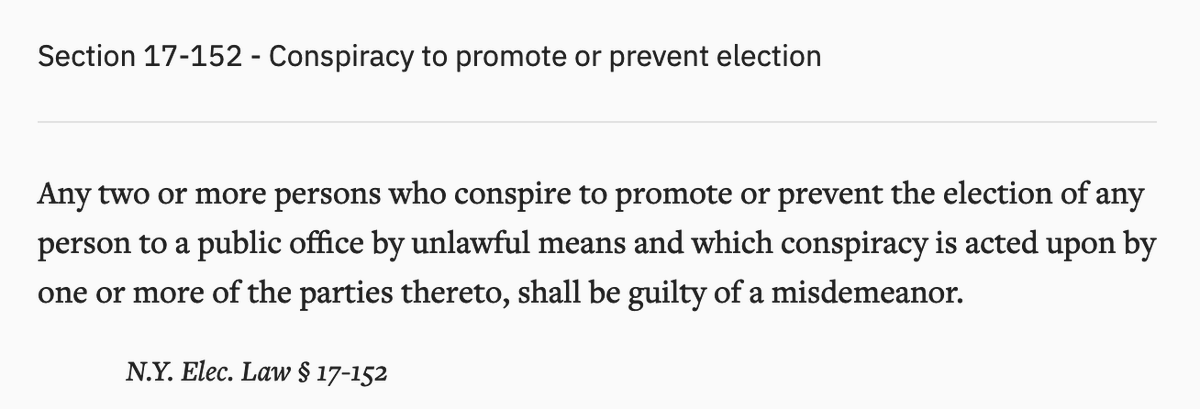
We're still in recess.
Standby for more soon.
Standby for more soon.
Trump heads back to the defense table.
Blanche seems to be in better spirits, after the sting of the morning session.
Blanche seems to be in better spirits, after the sting of the morning session.
Note:
Folks have informed me about problems accessing my play-by-play posts. You may want to turn on notifications, including for replies.
Thanks for flagging, and I'll look into any technical issues.
Now, back to the trial.
Folks have informed me about problems accessing my play-by-play posts. You may want to turn on notifications, including for replies.
Thanks for flagging, and I'll look into any technical issues.
Now, back to the trial.
Pecker's questioning resumes.
Q: Are business emails relied upon in making business decisions?
A: Yes, they are.
Q: Are business emails relied upon in making business decisions?
A: Yes, they are.
(FWIW, I assume this is just general glitches on the platform today.)
The prosecutor asks a number of question laying for the foundation for introducing emails and text messages into evidence.
Bove objects to the admission of the exhibits on hearsay and other grounds.
Another nugget from a @BenFeuerherd dispatch from the hallway press pool, just between morning session and trial:
"Trump ignored the following questions from the pool:
—Are you going to keep Truthing?
—How are your lawyers doing?
—Does your lawyer have any credibility?"
"Trump ignored the following questions from the pool:
—Are you going to keep Truthing?
—How are your lawyers doing?
—Does your lawyer have any credibility?"
After a sidebar, Justice Merchan overrules an objection from Trump's defense.
Questioning turns to Dino Sajudin, the doorman who peddled the false story that Trump fathered a child out of wedlock.
Questioning turns to Dino Sajudin, the doorman who peddled the false story that Trump fathered a child out of wedlock.
Pecker:
"Dino was in the market selling the story that Donald Trump fathered an illegitimate girl with a maid" at Trump Tower.
"Dino was in the market selling the story that Donald Trump fathered an illegitimate girl with a maid" at Trump Tower.
Pecker said he ran the story by Michael Cohen, who replied the story was "Absolutely not true — but I'll check it out."
Pecker had been about to refer to the plan to polygraph Dino Sajudin, a topic that's inadmissible:
"Don't say that," Steinglass reminds him.
The prosecutor needs to cut him off again later on the same issue.
"Don't say that," Steinglass reminds him.
The prosecutor needs to cut him off again later on the same issue.
Pecker says he spoke about the payoff of Sajudin with Michael Cohen, who asked: "Who's going to pay for it?"
"I'll pay for it," Pecker recalls him saying.
"He said, 'The boss will be very pleased,'" a remark Pecker sees he understood to be "Donald Trump."
"I'll pay for it," Pecker recalls him saying.
"He said, 'The boss will be very pleased,'" a remark Pecker sees he understood to be "Donald Trump."
Pecker agrees that he never before paid money, let alone $30,000, to not publish a story.
"If the story came back true, I would publish the story shortly after it was verified," Pecker said.
Q: Before or after the election?
A: After the election.
"If the story came back true, I would publish the story shortly after it was verified," Pecker said.
Q: Before or after the election?
A: After the election.
The agreement with Sajudin is entered into evidence and displayed on screens inside the courtroom.
The contract called for Sajudin to receive the $30,000 within five days.
"We discovered that [the story was] absolutely, 1,000% untrue," Pecker says.
"We discovered that [the story was] absolutely, 1,000% untrue," Pecker says.
Q: So why are we paying $30,000 for an untrue story?
A: If it got out to another media outlet, it would be very embarrassing to the campaign.
Q: So it was a way to lock it up.
A: That is correct.
A: If it got out to another media outlet, it would be very embarrassing to the campaign.
Q: So it was a way to lock it up.
A: That is correct.
Asked about the clause indicating AMI's exclusivity period extended "in perpetuity," Pecker says: "That means that we own the story forever."
Q: Is [$30,000] a typical sum for a source?
A: No, it's not.
Pecker notes it's much larger, ranging from $250 to $5,000, or maybe up to $10,000 for a bigger celebrity.
A: No, it's not.
Pecker notes it's much larger, ranging from $250 to $5,000, or maybe up to $10,000 for a bigger celebrity.
Trump's defense objects to the next email flashed on the screens.
It's taken down, and the parties approach for a sidebar.
It's taken down, and the parties approach for a sidebar.
Justice Merchan rules that the exhibit can be displayed, "subject to the redaction we discussed" at sidebar.
It's an email from a reporter to an accounts payable employee.
The email:
"This serves as an invoice for immediate $30,000 [...] bank transfer payment from AMI to source Dino G. Sajudin regarding 'Trump' non-published story."
"This serves as an invoice for immediate $30,000 [...] bank transfer payment from AMI to source Dino G. Sajudin regarding 'Trump' non-published story."
The email also refers to AMI's general counsel Cameron Stracher, whom you can learn more about here. justsecurity.org/94696/trump-cr…
Once confident the story was false, Pecker wanted to release Sajudin from the NDA, and he says Michael Cohen couldn't understand why when he told him that.
Pecker says he told Cohen having Sajudin "locked in" was "only going to cause us more problems."
Pecker says he told Cohen having Sajudin "locked in" was "only going to cause us more problems."
According to Pecker, Cohen asked, "When?"
"I said, 'I'd like to release [Sajudin] now,'" Pecker testifies.
Pecker says Cohen responded, "No," pushing AMI to release Sajudin "after the election."
"I said, 'I'd like to release [Sajudin] now,'" Pecker testifies.
Pecker says Cohen responded, "No," pushing AMI to release Sajudin "after the election."
Questioning turns to Karen McDougal:
"I called Michael Cohen and I told Michael Cohen exactly what Dylan [Howard] told me about this Playboy model."
Cohen said that was not true, "absolutely" not true.
"I called Michael Cohen and I told Michael Cohen exactly what Dylan [Howard] told me about this Playboy model."
Cohen said that was not true, "absolutely" not true.
Pecker said, "Wait a minute," adding they should "vet this story out."
Pecker suggested that he told Cohen "this one is a little different," referring to McDougal's account.
Pecker says Cohen told him that they should not be discussing this over a landline, and they should pivot to Signal, the encrypted app with disappearing messages if activated.
He quips he still doesn't know whether it's true messages are "destroyed" after sending.
He quips he still doesn't know whether it's true messages are "destroyed" after sending.
Pecker says that McDougal claimed to have had interest in the story from ABC's "Dancing with the Stars" — and a Mexican group for $8 million.
The witness says he disbelieved it, but proposed Trump purchase the story anyway.
The witness says he disbelieved it, but proposed Trump purchase the story anyway.
According to Pecker, Trump told him: “Anything that you ever do anything like this, it always gets out.”
Trial adjourns early today once again, in observance of the second night of the Passover holiday.
This allows any observant attorneys and jurors to attend seders, traditionally taking place on the first two nights.
This allows any observant attorneys and jurors to attend seders, traditionally taking place on the first two nights.
Standby for post-trial matters.
After a brief exchange with Trump's attorney Emil Bove on a housekeeping matter, Justice Merchan adjourns proceedings entirely.
No ruling from the bench on the pending contempt matter.
Trump and his team file out of the courtroom.
No ruling from the bench on the pending contempt matter.
Trump and his team file out of the courtroom.
• • •
Missing some Tweet in this thread? You can try to
force a refresh

